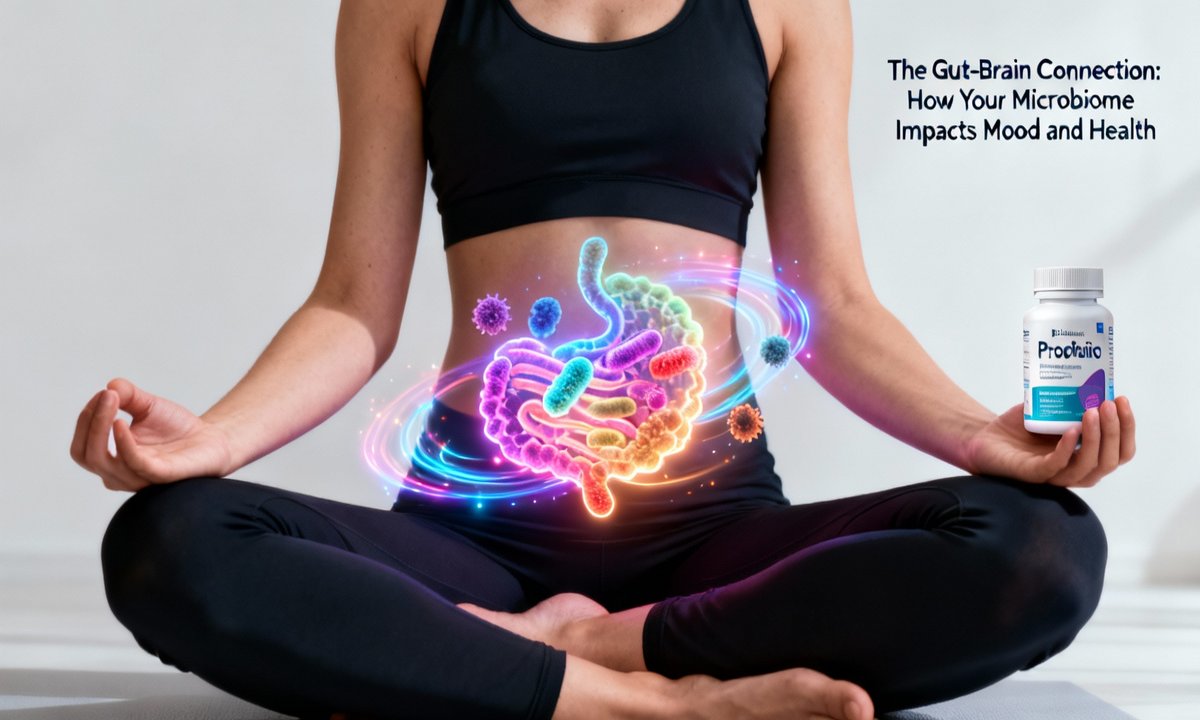Imagine a profound connection influencing your mood, cognitive clarity, and resilience against stress. This intricate link isn’t solely within your mind but deeply rooted in the trillions of microbes inhabiting your gut. Recent discoveries illuminate how this gut-brain connection, often called the gut-brain axis, significantly shapes our mental health and overall well-being.
Unveiling the Gut-Brain Connection
This fascinating area of research reveals how nurturing your gut microbiome can lead to a healthier, happier mind. In today’s dynamic world, many are seeking mental clarity and emotional balance. Understanding the role of your internal ecosystem may be the missing element to unlock both optimal brain health and emotional stability.
What is the Gut Microbiome?
Your gut microbiome is a bustling and diverse community of bacteria, viruses, fungi, and other microorganisms living within your intestinal tract. Far beyond aiding digestion, these tiny residents are vital for producing essential vitamins, regulating immune responses, and influencing how you feel and think. Every meal, medication, and even stressful events can profoundly impact this complex internal ecosystem.
A balanced microbiome is reflective of internal harmony. Conversely, an imbalanced state, known as dysbiosis, has been linked to various issues. These can include digestive discomforts, feelings of sluggish energy, and even a noticeable impact on mood.
The Gut-Brain Axis: A Communication Superhighway
The gut-brain axis functions as a critical communication superhighway, facilitating constant dialogue between your gut and your brain. This intricate network operates through nerve signals, particularly the vagus nerve, as well as hormones and various immune messengers. Your gut continuously sends signals that can influence your brain’s stress response, memory retention, and emotional state .
Remarkably, these gut microbes also play a role in producing neurotransmitters, which are essential brain chemicals like serotonin and dopamine. These crucial compounds flow throughout both the gut and the brain. It is noteworthy that over 90% of serotonin, a powerful mood-boosting chemical, originates in your gut.
Real-Time Microbial Sensing
Breakthrough discoveries have identified “neuropod” cells within your gut. These unique sensory cells function as sentinels, designed to detect microbial signals and instantly relay these messages to your brain. Imagine these as tiny communication hubs, providing your brain with real-time updates on internal gut activities .
As a result of this rapid communication, your brain can react almost instantaneously to changes in diet, shifts in microbial populations, or even potential internal threats. This adaptive capability allows for immediate adjustments in mood, appetite regulation, and overall behavior.
Microbiome’s Influence on Mood and Mental Health
Extensive research increasingly demonstrates the profound impact of the gut-brain connection on the risk and severity of various mental health conditions. This includes depression, anxiety, bipolar disorder, schizophrenia, and even neurodegenerative diseases . Dysbiosis, characterized by an imbalance in gut diversity, can trigger increased neuroinflammation and disrupt essential neurotransmitter production.
Maintaining a healthy gut environment is associated with improved stress resilience, greater emotional stability, and enhanced cognitive clarity. Persistent feelings of low mood or worry might not solely be “in your head”; they could also reflect imbalances within your gut. This emphasizes the holistic nature of well-being.
How Gut Bacteria Affect Neurotransmitters and Stress
Specific types of gut bacteria have the capacity to enhance the production of vital neurotransmitters like GABA, serotonin, and dopamine. These chemicals are fundamental for effective emotional regulation and fostering a sense of inner peace . Low levels, often observed during periods of dysbiosis, are frequently linked to symptoms of anxiety and depression.
Beyond neurotransmitter production, gut health significantly influences your body’s stress response mechanisms. When your microbiome is in a balanced state, you are generally better equipped to navigate and respond to the daily challenges and fluctuations of life without feeling easily overwhelmed.
The Role of Short-Chain Fatty Acids (SCFAs)
Short-chain fatty acids (SCFAs), such as butyrate and acetate, are naturally occurring anti-inflammatory compounds produced by beneficial gut bacteria. Studies indicate that individuals experiencing mood imbalances often exhibit lower levels of these protective compounds. SCFAs play a major role in calming inflammation and fueling brain cells .
Microbiome’s Effect on Cognitive Function and Memory
The scientific evidence is increasingly clear: your gut microbiome exerts a significant influence on cognitive function, memory recall, and even your decision-making processes. SCFAs, for instance, are crucial in safeguarding synaptic connections within the brain. This protection helps preserve memory and learning abilities as we age .
Furthermore, an imbalanced community of gut bacteria may elevate the risk for neurodegenerative disorders. Conditions like Alzheimer’s and Parkinson’s diseases have shown links to disruptions in the delicate balance of the gut microbiome, highlighting its broad impact on neurological health .
Diet, Lifestyle, and the Gut-Brain Axis
What you consume stands as one of the most influential factors shaping your gut-brain health. A diet rich in high-fiber foods, various fermented products, and diverse plant-based meals actively fosters a robust microbiome. This, in turn, enhances both digestive efficiency and cognitive function.
Conversely, a diet high in ultra-processed foods, excessive sugar, and routine antibiotic use can diminish microbial diversity. Such dietary and lifestyle choices can easily tip your internal ecosystem into a state of dysbiosis, impacting overall well-being . For nourishing recipe ideas, consider exploring our guide to Plant-Based Power: Easy & Flavorful Vegan Recipes for Healthy Weeknight Meals.
Batch-prepping meals abundant in fiber and fermented foods—like oats, beans, kimchi, and sauerkraut—can simplify the process of eating for both brain and gut health. This approach makes healthy eating both easy and affordable. Discover more ideas to get started with Mastering Meal Prep: Delicious & Frugal Recipes for the Whole Week.
Environmental and Societal Factors Affecting Your Microbiome
Beyond dietary choices, various external factors also significantly impact the diversity and resilience of your gut microbiota. Chronic stress, environmental pollution, habitual use of antibiotics, and a lack of regular physical activity all contribute to shifts within this vital internal community .
Over the long term, consistent exposure to these factors can present significant challenges to cognitive health and even emotional stability. Public health researchers are actively investigating community-based strategies to improve national mental health outcomes through better microbiome stewardship practices.
Dysbiosis: When Your Microbiome is Out of Balance
Dysbiosis occurs when the delicate harmony among your gut microbes is disrupted. This imbalance can manifest as one bacterial population growing excessively, or a reduction in beneficial bacteria. Recognizing the signs of dysbiosis is crucial for addressing potential underlying issues.
Common indicators that your gut microbes may be out of balance include frequent bloating or persistent digestive discomfort. You might also experience feelings of low energy, difficulty concentrating often described as brain fog, or increased anxiety and irritability. Other signs can involve disturbed sleep patterns and heightened cravings for certain foods. These symptoms collectively highlight the critical importance of a balanced gut-brain axis for both emotional and physical well-being. If you often experience these issues, consider a lifestyle check-in and consult a qualified practitioner if symptoms persist.
Optimizing Gut-Brain Health: Practical Tips
The encouraging news is that it is never too late to begin nurturing your gut-brain axis for improved health. Simple, consistent efforts can make a significant difference. Incorporating these practical tips into your daily routine can support a thriving internal ecosystem.
Embrace Fiber-Rich Plant Foods
Prioritize eating a greater variety of fiber-rich whole plant foods, including whole grains, legumes, diverse vegetables, nuts, and seeds. These choices actively enhance overall gut health and provide essential nourishment. Further insights into this connection can be found through resources on the gut-brain connection.
Integrate Fermented Foods
Regularly incorporate fermented foods into your diet. Options like yogurt with active cultures, kefir, kimchi, tempeh, or sauerkraut naturally introduce a wealth of beneficial microbes. These foods are a simple way to boost your microbial diversity.
Reduce Ultra-Processed Foods and Sugar
Consciously reduce your intake of ultra-processed foods and added sugars. These dietary components tend to feed less helpful gut bacteria, which can contribute to dysbiosis and negatively impact your gut’s delicate balance.
Stay Hydrated and Active
Ensure you stay adequately hydrated throughout the day and engage in daily physical activity. Both hydration and regular movement play important roles in regulating gut motility and can significantly help in reducing stress levels.
Manage Stress Effectively
Implement stress management practices into your routine. Techniques such as mindfulness, meditation, and yoga are effective in lowering gut inflammation and actively supporting microbial diversity within your system.
Limit Unnecessary Antibiotics
Be mindful of antibiotic use and limit them to when absolutely necessary and prescribed by a healthcare professional. Antibiotics can dramatically alter your microbiome, so responsible use is key to preserving gut health. Explore delicious ways to integrate gut-friendly foods into your weekly plan with Budget-Friendly Meal Prep: Delicious Dinners Under $5 Per Serving for Busy Weeks.
Emerging Therapies for Microbiome Health
Therapeutic strategies are increasingly harnessing the remarkable power of the microbiome in innovative ways. Probiotic supplements, for example, contain live beneficial bacteria that may help rebalance gut flora and potentially alleviate symptoms of anxiety or depression . Prebiotics, which are specific types of fibers, act as nourishment, feeding friendly bacteria and supporting their healthy growth.
In more severe medical scenarios, healthcare teams are exploring fecal microbiota transplantation (FMT). This procedure involves transferring healthy gut bacteria from a donor to a recipient, showing promise as a treatment for certain neurological and digestive disorders. While these emerging therapies hold significant potential, further long-term research is essential to fully understand their benefits and applications .
Supporting Your Gut-Brain Axis Daily
Nurturing a healthy microbiome doesn’t have to be complicated. You can begin with simple, impactful daily habits. These small steps can cumulatively contribute to improved gut and brain health.
Diverse Plant-Based Eating
Strive to eat a wide range of colorful plant foods, ensuring your diet is rich and varied.
Daily Fermented Foods
Aim to include fermented foods like yogurt, kimchi, or sauerkraut as a regular part of your daily meals.
Consistent Physical Activity
Maintain a routine of staying physically active, as movement supports overall gut function.
Mindful Stress Management
Incorporate mindful practices to manage stress effectively, fostering both mental and gut well-being.
If you’re looking to enhance your home environment for overall well-being, discover easy Sparkling Home, Green Living: DIY Natural Cleaning Recipes for Every Room or discover easy ways to improve your indoor air quality, which can indirectly support gut and brain balance.
Frequently Asked Questions (FAQ)
Can gut health affect mental health?
Yes, absolutely! Numerous studies confirm that a balanced gut microbiome plays a crucial role in regulating neurotransmitter production, reducing neuroinflammation, and supporting stress resilience . Gut health is profoundly linked to your mood and overall brain health.
What are signs of an unhealthy microbiome?
Common indicators include frequent digestive upset, experiences of brain fog, persistent low mood, increased cravings for sugar, and sleep disturbances. If you experience persistent symptoms, it is advisable to consult a health professional for personalized guidance.
How does my gut affect my mood?
Your gut bacteria are instrumental in producing vital neurotransmitters, such as serotonin, and significantly influence your body’s stress response mechanisms. An imbalance, known as dysbiosis, can lead to lower levels of these positive mood-enhancing chemicals, potentially contributing to feelings of anxiety or depression .
What foods promote a healthy gut-brain axis?
A diet rich in diverse fruits, vegetables, high-fiber whole grains, legumes, and fermented foods such as yogurt, kimchi, or sauerkraut are excellent choices. For more recipe inspiration and guidance, explore our Plant-Based Power guide.
Are probiotics and prebiotics safe for everyone?
For the majority of individuals, probiotics and prebiotics are considered safe. However, those with existing immune disorders or individuals taking immunosuppressive medications should always consult a healthcare provider before introducing supplements.
References and Further Reading
* Stanford Medicine: Gut-Brain Connection and Mental Health
* Duke University’s Sixth Sense: Neuropods and the Brain
* PubMed: Microbiota-Gut-Brain Axis (2025)
* Cleveland Clinic: Gut-Brain Axis Overview
* Frontiers in Microbiology: Microbiome and Mood
* NIEHS: Microbiome & Environmental Factors
* Nature: Mental Health Therapies And Microbiome
* NIH: The Human Microbiome
* Harvard Health: The Gut-Brain Connection
* Plant-Based Power: Easy & Flavorful Vegan Recipes for Healthy Weeknight Meals
* Mastering Meal Prep: Delicious & Frugal Recipes for the Whole Week
* Budget-Friendly Meal Prep: Delicious Dinners Under $5 Per Serving for Busy Weeks
* Sparkling Home, Green Living: DIY Natural Cleaning Recipes for Every Room
* Improve your indoor air quality
Curious how your own habits support (or challenge) your gut-brain health? Explore more simple wellness habits and recipes throughout our site—for a happier, healthier you every day.
Note: This article is not medical advice. If you experience ongoing digestive, mood, or neurological symptoms, consult with your healthcare provider.
Share your thoughts, experiences, or gut-friendly recipes with our community. Join the discussion below!



